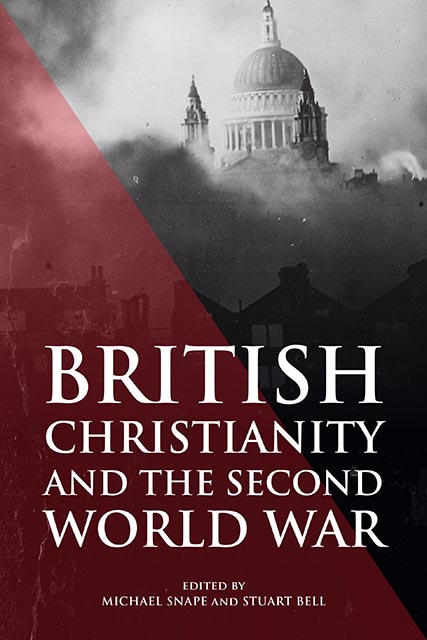Book contents
- Frontmatter
- Dedication
- Contents
- Contributors
- Acknowledgements
- Note on Footnotes
- Abbreviations
- 1 Introduction
- 2 The British State and Spiritual Mobilization during the Second World War
- 3 Radio Religion: The British Broadcasting Corporation and Faith Propaganda at ‘Home’ and ‘Overseas’ in the Second World War
- 4 Getting the Message Out: Publishing ‘British Christianity’ 1939–43
- 5 Christianity, Culture, and the Universities in Wartime England
- 6 Mass Observation, Religion, and the Second World War: When ‘Cooper’s Snoopers’ Caught the Spirit
- 7 British Sunday Schools during the Second World War
- 8 Principled or Pragmatic? English Nonconformist Opposition to Pacifism in the Inter-War Period
- 9 Where Loyalties Lie: English Catholic Responses to Allied Strategic Bombing in the Second World War
- 10 British Christians and the Morality of Killing in the Second World War
- 11 Jewish-Christian Relations in the Second World War
- 12 Agents of Occupation or Reconciliation? Army Chaplains in Germany in the Summer of 1945
- Index
- Studies in Modern British Religious History
5 - Christianity, Culture, and the Universities in Wartime England
Published online by Cambridge University Press: 21 June 2023
- Frontmatter
- Dedication
- Contents
- Contributors
- Acknowledgements
- Note on Footnotes
- Abbreviations
- 1 Introduction
- 2 The British State and Spiritual Mobilization during the Second World War
- 3 Radio Religion: The British Broadcasting Corporation and Faith Propaganda at ‘Home’ and ‘Overseas’ in the Second World War
- 4 Getting the Message Out: Publishing ‘British Christianity’ 1939–43
- 5 Christianity, Culture, and the Universities in Wartime England
- 6 Mass Observation, Religion, and the Second World War: When ‘Cooper’s Snoopers’ Caught the Spirit
- 7 British Sunday Schools during the Second World War
- 8 Principled or Pragmatic? English Nonconformist Opposition to Pacifism in the Inter-War Period
- 9 Where Loyalties Lie: English Catholic Responses to Allied Strategic Bombing in the Second World War
- 10 British Christians and the Morality of Killing in the Second World War
- 11 Jewish-Christian Relations in the Second World War
- 12 Agents of Occupation or Reconciliation? Army Chaplains in Germany in the Summer of 1945
- Index
- Studies in Modern British Religious History
Summary
While a lot of attention has been paid to the reform of education during the Second World War and to the role of religion in it, little has been written about wartime debates about universities. In part this is because the principal wartime educational reforms, particularly the 1944 Education Act, related to schools rather than universities. As Peter Mandler has rightly noted, ‘higher education did not figure prominently in the consciousness either of the nation or even of politicians at the end of the Second World War.’ Because universities were not an arm of the state (though they were partly funded by it), they lacked the political resonance of schools. Nevertheless, the war brought dramatic short-term disruption to universities; some moved from London to the provinces, for example, while military service meant that male humanities students virtually disappeared. The war also occasioned a debate about the purpose of universities in society, which began early in the conflict and continued after its end. In a conflict which Britain was avowedly fighting for ‘Christian civilization’, the role of universities in guarding and transmitting that civilization was much discussed and Christian authors featured prominently in the discussion. As David Paton, a former Student Christian Movement (SCM) officer at Birmingham University, put it in 1939, ‘the present distress of the university can only be understood in the light of the whole dilemma of European culture.’
Among Christians, the debate about universities was largely conducted by lay intellectuals, rather than clergy, and like several other wartime debates it was inter-denominational. It occurred in overlapping forums including the Moot, the discussion group which met from 1938 to 1947, the pages of the Christian News-Letter, and the activities of the SCM. All these forums included Protestants of different denominations, and the Moot also included some Catholics and Jews. Most of the protagonists were male (with one significant exception, Amy Buller) and most shared elitist assumptions about the nature of universities – university was still considered as a destination for a small number of students, and discussion focused on what to teach that small elite, not on expanding the number of universities or the type of students attending them. The English university sector was tiny by modern standards, with only 50,000 full-time students studying in eleven full universities and five university colleges before the Second World War.
- Type
- Chapter
- Information
- British Christianity and the Second World War , pp. 82 - 98Publisher: Boydell & BrewerPrint publication year: 2023



